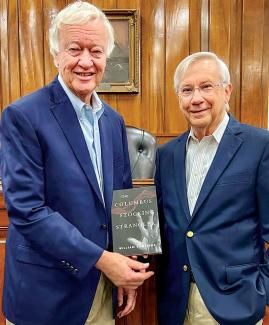The Columbus Stocking Strangler is Rawlings’ 12th published book since he took up the hobby of writing as a diversion from his duties as a primary care doctor in his hometown of Sandersville, Georgia. The book is in its fourth printing, less than three months after its release.
“The practice of medicine is intense once you get into it,” said Rawlings, “and you need a distraction. You need something that you enjoy.”
Curiosity motivates Rawlings. “I like exploring things,” he said. He’s written suspense fiction and histories of the Ku Klux Klan and lighthouses in Georgia. His book A Killing on Ring Jaw Bluff is the story of the crash of the cotton economy in which his great uncle figures prominently as a wealthy man who eventually lost everything and was convicted of murder.
“I like stories,” he added. “I think Southerners tend to tell stories. We could sit here for hours, and I would tell you stories, all of which were true or perhaps slightly exaggerated.”
The truth is, Rawlings said, “I like writing.” He wrote 10 of his books while still practicing medicine (he retired from medicine only four years ago). “To my tremendous surprise, I was successful at it.”
His other true crime book is Six Inches Deeper (Mercer, 2020) about the murder of a 34-year-old mother of three and secretary in southern Georgia. “I’m finding out, true crime has a huge following,” said Rawlings.
SETTING THE RECORD STRAIGHT
To research The Columbus Stocking Strangler, which he wrote in 10 months during the midst of COVID-19, Rawlings read 15,000 to 20,000 pages of transcripts, the extensive newspaper coverage of the case and police reports. He also interviewed dozens of people.
In a sensational, controversial story like this, accuracy and documentation are vital, said Rawlings, explaining the “just the facts, ma’am, style” of writing in the book. “The story is so complicated.”
Smith acknowledges that his career has been defined, whether he wanted it to be or not, by this case. He is grateful that Rawlings wrote the book “to set the record straight.”
Smith served as assistant district attorney for seven years and then served 11 years as the District Attorney of the Chattahoochee Judicial Circuit, a six-county circuit. In 1988, he became a judge, a position he held for 14 years. Semi-retired since 2002, he continues as a part-time senior judge.
“I sure didn’t write the book,” Smith said. “I wouldn’t take any credit for that.”
But Smith is relieved that the facts of the case are presented in this book. “I feel justified that the truth has been told. The story is spectacular enough. It’s dark, and it’s horribly unfortunate. It did not need embellishment. And he [Rawlings] didn’t embellish it.
“The facts are there, and he did a great job of putting it all together and expressing it.”































































